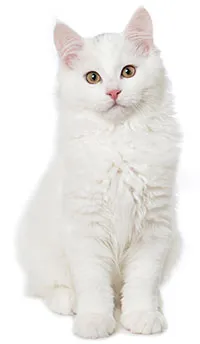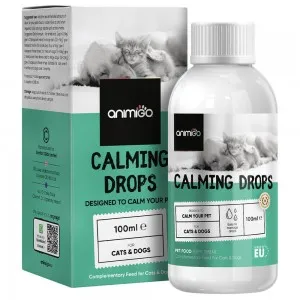What is cat separation anxiety?

As the name suggests, cat separation anxiety is when your feline friend feels stressed or nervous when you’re not with them. This can be anywhere from when you leave the house or when you simply leave the room and results in a number of unwanted behaviours that can not only cause a mess but can potentially harm your furry friend. As a result, it is paramount that, as a loving cat owner, you either teach your kitten from a young age how to cope without you when you are away, or if your cat is already past that stage, try some cat calming techniques. But before you can help, you need to know the causes of cat anxiety and what can make them feel this way in the first place.
Causes of cat separation anxiety
In general, cat anxiety can occur due to a number of reasons. This includes loud noises such as thunderstorms, travelling and meeting new people. One of the biggest causes of anxiety in cats long-term, however, is due to separation. This can be for a number of reasons and usually means that they have become too attached to you and, as a result, can handle you not being there and them being on their own. Here are some of the main causes of cat separation anxiety, although do bear in mind that all cats are different and it may be caused by something more specific!
New pet parents
Whether its’ early or late in their lifetime, for whatever reason a cat may change pet parents, it may, of course, cause them some distress. This sort of change is also usually accompanied with a new home and living situation. This can make them feel nervous in general, but add on top their insecurities of whether or not you will actually come back home can make them a bit clingy.
Not spending enough time with us
Being a cat owner means you’ve committed to looking after your beloved feline companion, but for some, it can be more of a challenge than first anticipated. Cats are less needy than dogs as pets go but still need love and attention. If they’re not getting to spend enough quality time with us, they won’t want us to leave, which could then result in cat separation anxiety.
Change in routine
Have you ever got a new job and taken time to adjust to your new schedule? Well, this feeling can be applied to our cats. Whether it’s longer working hours or a new member of the family taking up your time, it can result in less attention for them which can lead to cat anxiety. It can also make them full of insecurities as routine helps them know what is happening and be calm.
Weaning too early or late
Kittens usually start weaning from their mothers when they reach 4 weeks old and then carry on until they’re about 7 weeks, but if this is not done correctly or if it is done too early or late then it can cause anxiety for both the mother and kittens. Not only can it result in a number of health issues, it can result in aggressive or shy behaviours that can come out when left alone.
Not knowing how to be alone
Cats need attention, but they also need to understand how to be left alone. If the only thing your cat knows is you by their side, as soon as you leave they will feel lost and anxious. If they are taught that it is okay for them to be by themselves and know that they can sleep, play or eat without you being there, it can be a great way to prevent cat separation anxiety.
Teaching clingy behaviour
If your cat is used to being clingy or being around you all the time, then when you leave this behaviour isn’t going to magically change. That’s why it may be nice to give them a treat and reward them when they come sit on your lap, but this reinforces clingy behaviour later on. So when you leave the house to go to work, they won’t understand why you’re not there.
Separation anxiety in cats signs and symptoms

So now you know the causes, what are some cat separation anxiety symptoms? This will, of course, vary from cat to cat and is dependant on the cause of their stress, but here are some of the most common cat anxiety symptoms and signs to look out for:
- Excessive meowing
- Pacing
- Not using the litter box
- Defecating on owners possessions
- Excessive self-grooming
- Eating too fast or not at all
- Vomiting
- Diarrhoea
How to calm an anxious cat?
If your cat is feeling anxious, there are some things you can do to help without having to go straight to serious and expensive cat anxiety medications. Before searching for cat anxiety treatments though, you need to make sure you know if that is the issue. Cat anxiety symptoms can overlap with a number of other issues, so you need to confirm the problem is caused by separation and not something more serious.
In most cases this is fairly straightforward; if they only exhibit the symptoms when you leave the room or when you pick up your keys or start putting on your shoes to leave, then it is most likely cat separation anxiety. If they show anxious behaviours all of the time, however, then it may be a different cause or another problem. Once you’re certain it is down to being apart from you, you can then take action to help them deal with the alone time in a safe and happy way. Some great steps to take include:
Training
Teaching your cat how to be alone from a young age is one of the best ways to prevent cat separation anxiety as they get older. To do this, begin by leaving the room for a few minutes and then rewarding them when you return. Keep doing this by each time extend the period of time they’re left alone. Make sure when leaving though that they have toys and things to do!
Diet and exercise
When it comes to cat anxiety, their diet and exercise routine can play a big part. Make sure they are getting a balanced diet with plenty of protein, fibre, vitamins and minerals. You can also include natural cat calming ingredients into their breakfasts or choosing calming cat food. In addition, they need to be able to exercise to help keep their stress and anxiety at bay.
Calming supplements
Another great addition to your cat’s diet either on a daily basis or as needed are cat calming supplements. You can find these in multiple forms depending on preference, including cat calming tablets and calming drops for cats. Some of the best natural ingredients to look out for in these include soothing chamomile and passion flower, plus ginger for a troubled stomach.
Distraction
When your cat is feeling distressed, a great way to help them is through distraction. Cat anxiety happens when all they can think about is you not being there, but if their thoughts are on something else it can help them to feel happier. Try giving them fun toys, leaving treats around the house for them to find or putting the radio on for some background noise.
Conclusion on cat separation anxiety

Although cat anxiety isn’t a pleasant thing for both you and your furry friend, there are many things you can do to help them through those stressful times without having to resort to anti-anxiety medication for cats. Firstly, teaching them that it is okay for them to be without you but that you will return is paramount in their understanding. There are also so many cat anxiety treatments you can try from the comfort of your own home, including trying new foods, giving them supplements designed as a calming aid for cats and even cat calming treats! You can even try some home anxiety in cats remedies and see how they fare. Overall though, it is all up to the needs of you and your cat and what works for them.






